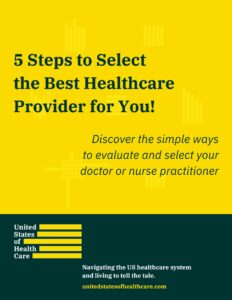What is a Health Advocate? What They Do, When You Need One, & Why
 When do you need a health advocate, and what does a health advocate do? These are essential questions that each of us may confront as we navigate our healthcare. Believe it or not, over 27% of US adults avoided medical treatment in 2019 due to confusion regarding insurance coverage and the healthcare system. In addition, those of us with chronic, ongoing conditions or a recent diagnosis that requires additional care can be overwhelmed sorting through the many decisions we must make.
When do you need a health advocate, and what does a health advocate do? These are essential questions that each of us may confront as we navigate our healthcare. Believe it or not, over 27% of US adults avoided medical treatment in 2019 due to confusion regarding insurance coverage and the healthcare system. In addition, those of us with chronic, ongoing conditions or a recent diagnosis that requires additional care can be overwhelmed sorting through the many decisions we must make.
How do we decide among specialists, understand and weigh second opinions; should we get a second opinion, what questions do we ask, and how do we understand the stakes for our future health? Not to mention how to cope and sort through the medical bills.
It’s no doubt, with so many decisions, navigating our healthcare can be overwhelming. Trying to understand the world of medicine while attempting to choose the best paths through the healthcare system for you or your loved one can seem like a daunting task. Fortunately, there are Health Advocates who can serve as your guide.
What does advocacy mean in healthcare?
Healthcare providers have their patient’s best interests in mind. However, what a health professional would choose for a patient may not be what a patient would choose for themselves. In healthcare, advocacy means promoting the desired goal of a person or group. A healthcare advocate can help you express your wishes, concerns, and needs to your healthcare providers. Your family, guardians, care partners, and friends may serve as your healthcare advocate. An advocate can also be a professional you hire to partner with you to understand and promote your healthcare goals.
Why is health advocacy important?
An advocate is very important in healthcare–especially if you have a complicated or ongoing condition. This way, you have someone with whom you can discuss the pro and cons of your care in-between visits with your doctor or nurse practitioner. Your advocate is part of your team helping you implement your care plan or manage the details of medical bills.
The first thing to do with your advocate –whether a friend, family member or hired professional is to ensure they have a solid grasp of your personal healthcare goals. Then, as your advocate, they will lobby for healthcare choices that align with your wishes.
Health advocacy promotes your right as an individual to make medical decisions that align with your beliefs and personal goals. In today’s increasingly complex healthcare system, the role of a health advocate can be a necessity.
What does a health advocate do?
A professional Health Advocate (also known as a patient advocate) provides patient-centered and direct services to an individual (and their family). Some ways an advocate helps is through:
- Serving as an informational resource regarding diagnoses, treatment, and billing
- Assisting you in gaining access to healthcare
- Keeping track of your treatment plan
- Researching treatment options and explaining the pros and cons of these options
- Guiding you through transitions during a transfer of care (e.g., from hospital to home)
- Organizing, categorizing, and checking billing and insurance coverage
This list includes only a few activities that Health Advocates perform, and many advocates do much more.
In short, a Health Advocate manages your healthcare logistics so that you and your family can concentrate on healing. Ultimately, however, a Health Advocate’s responsibility is to look out for your needs and interests with honesty and compassion.
Who can be a health advocate?
Although you may choose to hire a professional Healthcare Advocate, a family or close friend can also serve as a Healthcare Advocate. Whoever you choose as your advocate, it’s a good idea to obtain a generic Health Insurance Portability and Accountability Act (HIPAA) release form allowing for the designated Healthcare Advocate to receive information directly from your healthcare providers.
Can a healthcare advocate override your authority or healthcare decisions?
Unless you give a Healthcare Advocate the legal right to do so, a Healthcare Advocate cannot make medical decisions for you. However, you may decide to provide an advocate the right to make decisions on your behalf by legally assigning them to do so through a Durable Power of Attorney for Health Care. Should a patient be incapacitated, an advocate can decide for them.
Protip: Durable power of attorney for healthcare is a big step and one that requires a great deal of thought and planning. Be sure to involve a trusted attorney, healthcare provider, and family member in this decision-making process. The American Bar Association provides some basic information on how to begin the process.
How to choose a Health Advocate
It’s essential to choose a Healthcare Advocate that makes you feel comfortable. A patient advocate should be knowledgeable, organized, compassionate, and confident. Look for someone who has experience with your specific condition. You can check out the AdvoConnection directory to find a health advocate in your area.
Protip: Greater National Advocates is a resource that can help you navigate the selection process. Their home page includes a video that describes how to select an advocate with the particular skill sets that are right for you–are you overwhelmed with medical billing? Are you or a loved one in the hospital and need extra help? Do you need help with doctor-patient communication? They outline the options and then have a directory by topic area from which you can choose.
Most Health Advocates come from a variety of fields and have previous training, such as:
- Social Work
- Case Management
- Nursing
- Hospital administration
- Law
In addition to the education necessary for their previous disciplines, Healthcare Advocates may have additional certifications.
What can you expect from a Health Advocate?
Before searching for a Healthcare Advocate, take note of what you need an advocate to do.
Ask yourself these questions and make a list of your needs. For example, will a Health Advocate need to …
- Schedule appointments and transportation?
- Review insurance co-pays?
- Attend healthcare appointments?
- Explain medications, treatment, and procedures?
- Help with a transition from hospital to home care, including discharge planning?
What you expect a Health Advocate to do might not align with the services they provide, so it benefits everyone to make needs clear from the start.
Keep in mind that a Health Advocate is not covered by insurance. It is an additional expense. Even a one-hour consultation with a knowledgeable advocate could make all the difference for you in complex situations. So even if you cannot afford an ongoing relationship, you may be able to afford a 1-hour consultation.
What kind of relationship to maintain with a Health Advocate
Although you might eventually become very friendly with your advocate, the relationship should be professional. One of the benefits of having a Healthcare Advocate is that this person is not entangled in your personal dynamics and, therefore, can make sound, objective recommendations to you and your family.
Is a health advocate right for you?
If you’re undergoing complex medical treatment, find yourself very intimidated by healthcare settings, or have difficulty organizing your healthcare schedule, a Health Advocate might be right for you.
Having a person who can guide you through the healthcare maze can improve treatment outcomes, reduce your overall costs, and — best of all — free up your attention so that you can focus on healing.

